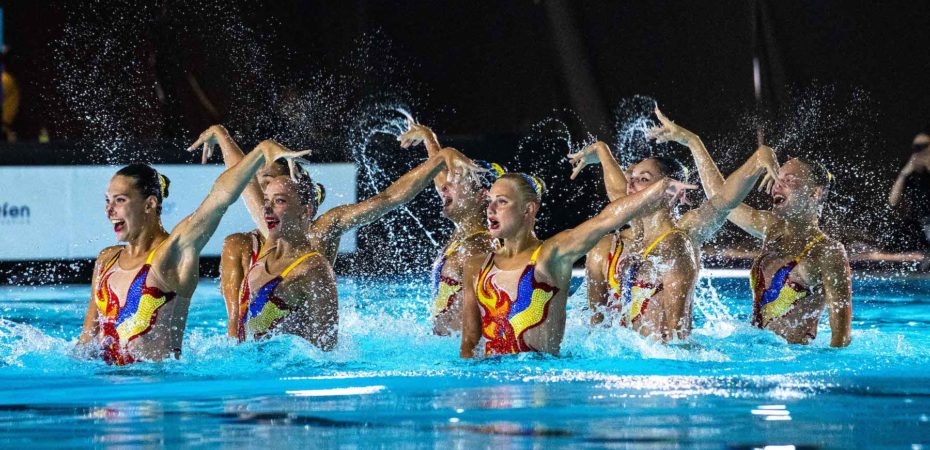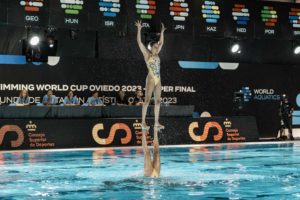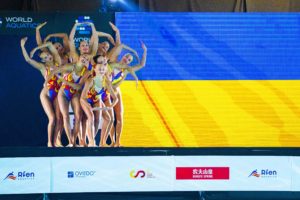Seven nations took part in the team events in the artistic swimming World Cup Super Final in Oviedo: Canada, China, France, Israel, Kazakhstan, Spain and Ukraine. Spain won gold in technical team, Israel in free team, and Ukraine in acrobatic team. China had only participated in one World Cup event this season in the team event, and was thus not eligible for medals or an official ranking in Oviedo.
China received the highest score in the technical team event with a 296.3834. Throughout the season, the Chinese have displayed great mastery of the new rules. They have notably found a great balance between high difficulty, strong execution, and interesting and powerful choreography.
In their routine set to the theme of “Speed and passion”, the Chinese increased their DD from 34.45 in Montpellier to 38.15. Head coach Zhang Xiaohuan explained she didn’t make any of the free hybrids longer since Montpellier. Rather, she focused on obtaining a smarter routine construction and on adding difficulty in the length of time already existing for each hybrid.
The music was composed especially for the team, and it took almost half a year to arrive at this final version. It was a team effort, with the coaches, athletes and musician aiming for a piece that would perfectly fit everyone’s strengths.
“At the beginning, we just asked the team’s musician to create the rhythm for our routine,” Zhang explained. “We asked the athletes to try different speeds in the water, different pace, to see what they would feel more comfortable with. It can seem difficult at first to pick up the speed, but they got used to it. Once we are used to the tempo, we tried to fix the hybrids, and we asked the musician to add some lyrics, melodies and other sounds inside the music. We changed the music many times and step by step; I don’t even remember the first version!”
China received the second-highest score in the acrobatic team with a 216.0900 for their “Light of Life” routine, and ended only 0.5801 points behind Ukraine.
Spain competed in all three team events, although the senior squad only swam in the technical event. Displaying great Technical Required Elements (TRE), the Spanish scored 278.2350 to win the gold in front of the home crowd with their choreography depicting a fusion of Spanish and Japanese music. They had significantly increased their DD since their last outing in Montpellier, going from 30.25 to 36.90.
The junior team swam in the free event with its “Witches” routine from last season, albeit revised for the new rules. They won silver with a score of 247.8666. Finally, Spain returned to the acrobatic event for the first time since Markham, with its roster made of the top juniors and the senior mixed duet squad. Although receiving full credit for everything, the squad couldn’t keep up with the rest of the field in terms of difficulty and placed fifth with a score of 184.2834.
Thanks to a very strong swim, Israel won the free team event with its Japan-themed routine and a score of 256.1375. The nation was the only team in that final to not receive any base marks, earning its full DD of 38.60.
“We are very, very happy that all the hard work that we have put in since Montpellier paid off,” Shelly Bobritsky said. “We increased the difficulty, and we are happy that we could do it all at the right time and in the right place.”
“Little by little, step by step, we tried to increase our difficulty in the team,” coach Valeria Aprielieva added. “We also wanted to make our acrobatics look better because the platform we did in Montpellier was really not done well. So we tried to create something more stable for this competition, and it all worked.”
The Israelis also earned bronze in the acrobatic team with a score of 191.6033 for their “Dream” routine, and finished fifth in technical team with a score of 233.5117. They compete next in less than 15 days, and the athletes are ready to keep pushing and making history for the country.
“I think our focus will also be a bit more on the tech team now,” Bobritsky said. “We have to change it a little because we haven’t really since the last World Cup. So, we will increase the difficulty in both tech and free. Our next stop is the European Games, and we will continue to fight.”
Overall, this competition was made of intense highs and lows for Ukraine. The country fared well in the duets as well as technical team and acrobatic team. The Ukrainians won the latter with a score of 216.6701. They have now won gold in this event in every World Cup leg this season. In the technical team, they unfortunately couldn’t keep up with Spain with their DD of 34.95. They did receive full credit, but had to settle for silver with 264.6566.
At the same time, the Ukrainians faced heartbreak in the solos and the free team. Across all events, the Ukrainians are seemingly going for high risk, high reward, but it hasn’t necessarily paid off as much as they would have hoped for.
For the free team, they had declared a massive 47.85 DD — at that time, the highest credited DD in free team in the World Cup circuit had been 36.95. Unfortunately, they simply couldn’t keep up and received five base marks for their “Team of the Brave” routine. That dropped them to fourth place with a score of 208.4480.
Joining Spain, Ukraine and Israel, Canada won two medals across the team events. The Canadians grabbed silver in acrobatic team (197.1600) with their “Hip-hop Classics” routine, and bronze in free team (217.2104) with their energetic Boxing routine.
France competed in the technical and acrobatic events, and came away with bronze in the former with a score of 243.1057. The French did receive a base mark on their final hybrid because of a complex pattern change. Nonetheless, they were happy with what they were able to show since their last meet in Soma Bay.
“Our strategy was to raise our difficulty,” Charlotte Tremble said. “Everyone’s DDs were increasing at every meet so we have tried to keep up with that. We are proud to have been able to change our routine so quickly and to swim it here. We are quite happy with the medal even though we could have gotten another color without our base mark. It’s encouraging for the rest of the season. We won’t stop here; there’s still a lot of adjustments to be made until the European Games and the World Championships. We will continue working hard and adapting to these new rules.”
Kazakhstan completed the team field but unfortunately also received numerous basemarks, including six in free team and one in acrobatic team.
The next major competition for the European nations will be the European Games, held in Poland from June 21 to 25. Canada, China and Kazakhstan will compete next at the World Championships in Japan starting on July 14.
ARTICLE BY CHRISTINA MARMET
Cover photo: Omar Rincón-Benzalá / Marilin García (RFEN)
If you’ve enjoyed our coverage, please consider donating to Inside Synchro! Any amount helps us run the site and travel costs to cover meets during the season.



